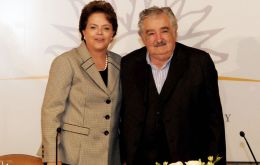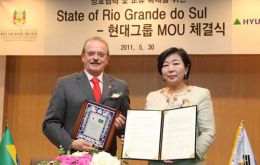MercoPress. South Atlantic News Agency
Brazil
-
Thursday, June 2nd 2011 - 04:15 UTC
Brazil gives definitive approval to world’s third largest hydroelectric dam project

Brazil's environment agency gave its definitive approval Wednesday for construction of the Belo Monte hydroelectric dam, a controversial 17 billion US dollars project in the Amazon that has drawn criticism from native Indians and conservationists.
-
Tuesday, May 31st 2011 - 22:47 UTC
Brazil and Paraguay with record crops of soy beans and export volumes

Mercosur members Brazil and Paraguay harvested unprecedented soy crops this year while Argentina’s results are disappointing limiting its exports, according to the latest report form Hamburg based Oil World.
-
Tuesday, May 31st 2011 - 22:46 UTC
Brazil approves system to elect representatives for Mercosur parliament

The Brazilian congress passed the rules for the election by political parties of Mercosur parliament representatives, which beginning 2014 are to be chosen by popular vote.
-
Tuesday, May 31st 2011 - 08:43 UTC
Uruguay and Brazil pledge full support for Mercosur and Unasur

Uruguay and Brazil pledged Monday to continue strengthening the bilateral relation and regional integration through Mercosur and Unasur, after presidents Jose Mujica and Dilma Rousseff delegations signed fifteen cooperation agreements in Montevideo.
-
Tuesday, May 31st 2011 - 08:35 UTC
Lagarde pledges in Brazil to give emerging economies more clout in the IMF

French Finance Minister Christine Lagarde pledged to push reforms to give Brazil and other emerging economies more influence at the International Monetary Fund as she kicked off a worldwide tour to win support for her candidacy to lead the global lender.
-
Tuesday, May 31st 2011 - 08:22 UTC
Industry ministers meet in Brasilia to address Argentina/Brazil trade differences

Argentine Industry Minister, Debora Giorgi, and her Brazilian counterpart Fernando Pimentel will meet this Thursday in Brasilia in order to discuss a possible solution for the trade conflict currently affecting Brazil and Argentina
-
Tuesday, May 31st 2011 - 08:13 UTC
Fiat was saved from collapse by sales in Latin America admits CEO Marchionne

Fiat and Chrysler Group president Sergio Marchionne said on Monday that car sales in Latin America saved the corporation’s balance sheet last year and announced an overall increase in car sale operations in accordance with regional demand.
-
Tuesday, May 31st 2011 - 08:06 UTC
Strong tendency to lower inflation in coming months is forecasted in Brazil

Brazil Central Bank head of Monetary Policy Aldo Mendes anticipated Monday that inflation in the coming two/three months will be almost flat, close to zero and supported his forecast on the food prices inflexion tendency.
-
Tuesday, May 31st 2011 - 07:58 UTC
Hyundai Group signs agreement to build industrial lifts plant in Brazil

The first Asian factory of industrial and residential lifts in Brazil will be built in the southern state of Rio Grande do Sul, it was announced Sunday in Seoul, Korea by the Hyundai Group.
-
Tuesday, May 31st 2011 - 07:47 UTC
Brazil plans massive infrastructure investment in next four years

Brazil’ president of the Economic and Development Bank, BNDES, Luciano Coutinho said that the country’s investment rate in the coming four years will be equivalent to 23% of GDP, sufficient to ensure a sustained robust long term growth of Latin America’s largest economy.
